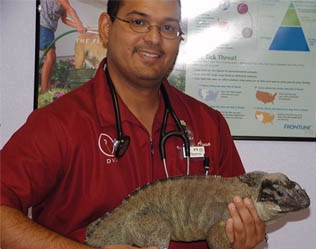[ad#250]
With the vast source of information available on the internet, and so many products readily available, do I really need a herp vet for my geckos? Can’t I just go to the vet my family sees for our dogs and cats?
First, let’s look at some common issues that many people have questions about. Stuck shed on feet or eyes, not eating, losing weight, lethargic behavior. While it’s fairly simple to work off a shed stuck on feet, eyes can be a bit tricky, but both can be done at home with a little skill and patience. However, if the shed remains intact, other complications will arise such as lost toes or eye infection. Not eating could be just a matter of incorrect husbandry, such as temperatures and lighting. What if all husbandry is right and your gecko is going downhill?
It doesn’t take long for a gecko to go from not eating to losing weight to exhibiting lethargic behavior. You need advice and most likely medication. Fact is, not all vets are qualified to treat reptiles, even those who see exotics. So, what is a qualified herp vet? Let’s ask one, Dr. Ivan Alfonso DVM, of Orlando Florida.
[ad#sponsor]

Laney: What, exactly, is a qualified herp vet?
Dr. Alfonso: In my opinion, a qualified herp vet is one that not only has knowledge of reptile health issues, but also is an avid keeper of reptiles. It is hard to know how to treat a reptile properly if you have not kept them as pets. This is why I have strived to keep as many species as possible over the years.
Laney: Why is it a bad idea to use readily available over the counter type medications for our geckos?
Dr. Alfonso: Although all medications we use for reptiles were developed for larger animals (dogs, cats, horses, cows, etc.), the dosages are different for reptiles and the medication concentrations (stock strength) can vary. Add to this the fact many OTC meds are not exposed to very good quality control and you are facing the potential of exposing your reptile to medications that, either do not work or could prove lethal.
Laney: What kind of issues do people bring their geckos to you for treatment?
Dr. Alfonso: Geckos are a very diverse bunch and present with many different issues. I have seen conditions ranging from parasite infection, retained sheds, malnutrition, calcium deficiencies, anorexia, eye issues, and pretty much everything in between.
Laney: There seems to be some confusion among gecko keepers as to the proper course of treatment for parasites. What is involved in fecal testing and why should it be done?
Dr. Alfonso:
Fecal testing is an invaluable tool in keeping geckos healthy. A fecal test usually involves a flotation where a fresh fecal sample is mixed with a flotation solution (sugar flotation, zinc flotation) and a microscope cover slip is placed on top of the container for 10 minutes. During this time the feces will deposit in the bottom while the parasite eggs float to the surface and attach to the cover slip. After the 10 minutes have passed, the sample on the cover slip is analyzed under the microscope and it is determined which parasites are present. Based on the findings, a proper medication and treatment protocol are chosen. Fecal exams should be done on a regular basis because it helps the keeper/breeder be on top of his collection’s health. Some parasites, like coccidia, are easy to contract and might not show obvious signs until they have affected the whole collection. Routine fecals can help catch any infections before they get out of hand. Also, doing fecals help in properly diagnosing the parasites and help develop a targeted treatment protocol which helps in getting rid of the problem quickly and effectively.
Laney: What about MBD? Is it treatable?
Dr. Alfonso: Metabolic Bone Disease (MBD) is an umbrella term used to describe different conditions that cause calcium deficiency in reptiles. In many cases it is reversible if treated on time. Every Veterinarian has a different way of treating the issue, but it is always aimed to correct the calcium levels in the blood and get it into the bones.
Laney: In conclusion, what would you advise someone who doesn’t have a herp vet, or know if they need to see one?
Dr. Alfonso: The best advice I can give someone looking for a reptile Vet is to find one before they really need one. Finding a reptile Vet you can trust is no different than finding an MD you can trust so, check around, check references and choose wisely. Places to check are www.arav.org and www.herpvetconnection.com.
Laney: Thank you for sharing your time and some insightful information with us.
Photo http://kirkmanareavet.com
Dr. Alfonso’s bio: Dr. Ivan Alfonso received his Veterinary Degree at the Tuskegee School of Veterinary Medicine in 2000 and now owns Kirkman Area Animal Clinic in Orlando, Florida. He also does Chameleon Health seminars as well as offering limited consultations at many Florida Repticon shows. His hobbies include freshwater and saltwater fish, reptile keeping and breeding, video games and just relaxing while watching his animals. He and his wife are owners of a pet pug, tortoiseshell cat, Eclectus parrot, and various reptiles and fishes.
Laney’s bio: Laney has a background in geriatric nursing which fed into her passion for lizard rehabilitation. She and her partner own ByTheShore Reptiles and have been breeding many species of lizards and snakes for over 10 years. They are active members of the Jacksonville Herpetological Society. She also enjoys growing orchids, making jewelry, baking and candy making.


Great post! My cousin recommended this blog and she was totally right keep up the fantastic work!
My leopard gecko either broke or dislocated its leg what should I do?
It’s hard to say without any more information and I’m not a vet. Your best bet is to find a reptile vet (http://arav.site-ym.com/search/custom.asp?id=3661) and take it for an examination.